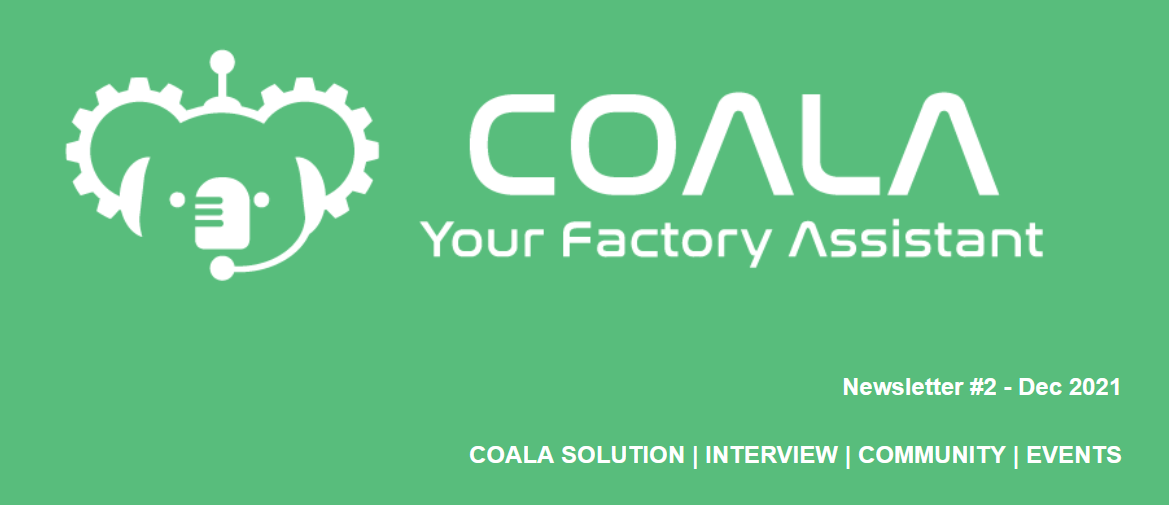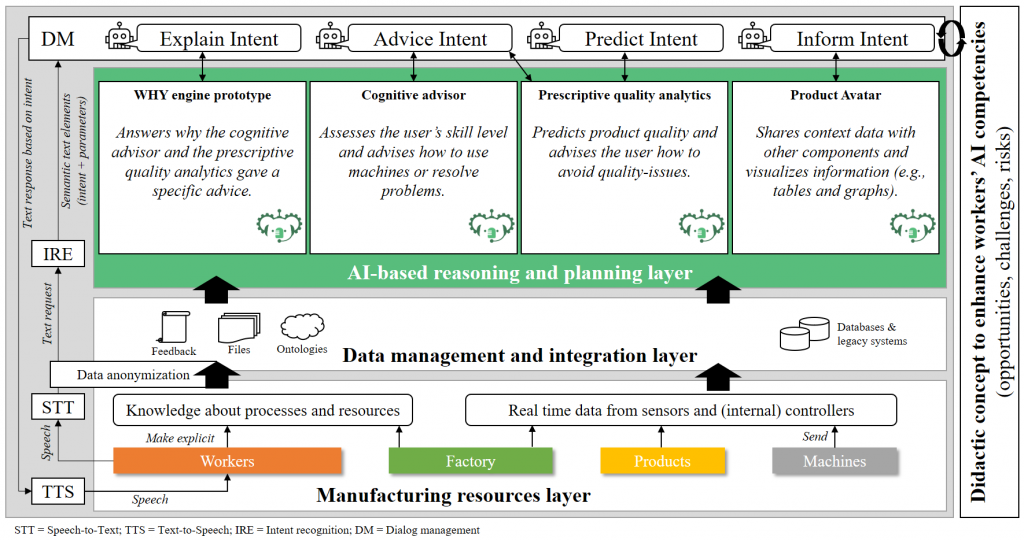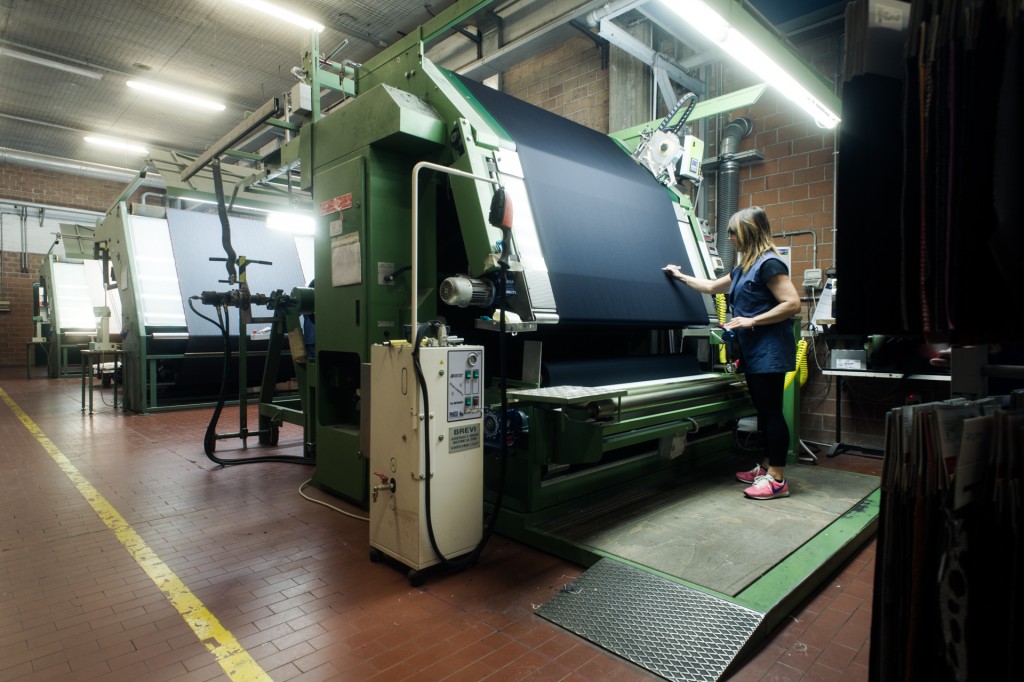
Welcome to COALA Newsletter December 2021
Dear reader,
After 15 months, COALA is close to reaching its third milestone. It will have a second prototype and its components will be ready for integration into the three industrial business cases. This issue will present COALA’s solution and its underlying components, as well as the introduction of the textile business case. This case focusses on training and development of textile worker’s AI competencies.
COALA partners have been active also in dissemination and community management activities. The next event co-organised by COALA is the 4th International Workshop on Key Enabling Technologies for Digital Factories (Ket4DF) in conjunction with CAiSE 2022, which will be held on 6 – 10 June 2022 in Leuven, Belgium. More detailed information on the paper submission date is available on the Ket4DF 2022 website. In the community and event sections of this newsletter, you will find some of the past and upcoming event highlights.
We hope that you will find our newsletter interesting and useful. If you have suggestions for future topics this newsletter should cover, do not hesitate to contact us.
Enjoy reading our newsletter!

Karl Hribernik
Project Coordinator
BIBA – Bremer Institut für Produktion und Logistik GmbH
SOLUTION
COALA Solution in a Nutshell

© COALA Consortium
The COALA solution has four main layers:
A) Manufacturing resources layer contains machines and manufactured products, as well as the workers and factory environment in a wider sense, which provide data, information and knowledge to the COALA system.
B) Data management and integration layer contains heterogeneous data storages, where personal data anonymization will be handled by the data anonymization service.
C) AI-based reasoning and planning layer processes the solution with Artificial Intelligence features and components, which focus on predictive quality and agile manufacturing:
1. Augmented Manufacturing Analytics feature, which includes a set of DIA functions interfacing with the prescriptive quality analytics service. This feature will allow non-data-scientist workers to access and customize quality descriptions, predictions and prescriptions during product quality tests.
2. AI-assisted on-the-job training for new workers feature, which includes a set of DIA functions interfacing with the cognitive advisor service. This feature aims to give advice to new workers in knowledge-intensive manufacturing processes, where the production plans are short-timed and workers must quickly realise them while maintaining the product quality. It will enable machine operators and production line managers to become effective faster, which will speed up changes in manufacturing.
The Augmented Manufacturing Analytics and AI-assisted on-the-job-training features are supported by two additional components:
- Why engine is a component that answers the users “why” questions about the AI’ decisions and the provided advice, prediction and information.
- Product avatar is a component that provides digital representations of individual machines and products, as a type of digital twin, which aggregates context information from individual manufacturing resources.
D) DIA dialog management layer is at the top of the solution and represents the intelligent, voice-enabled, mobile user interface. It bases on the open source, privacy focused assistant, Mycroft, and will feature four actions: Explain (for building trust), Advice (to help users perform their tasks), Predict (to inform about future events), and Inform (to provide facts and resource status). COALA will extend the Mycroft’s existing functions to meet manufacturing requirements, such as time criticality, reliability when dealing with factory noise, safety when giving advice to workers and security in business environment. A couple of demonstration videos showing the first implementation of the COALA Digital Intelligent Assistant can be checked on our website.
Last but not least, a didactic concept complimented the COALA solution in helping workers to build their competencies in human-AI collaboration. Some media materials, exercises, and competencies tests to teach factory workers and evaluate their learning progress regarding the opportunities, challenges and risks when working with an AI-based digital assistant will be developed within the project.

Stefan Wellsandt
Project Coordinator
BIBA – Bremer Institut
für Produktion und Logistik GmbH
INTERVIEW
AI-assisted on-the-job training for textile workers

district Biella © Piacenza
The COALA solution will be deployed and validated against three industrial use cases: (1) white goods, (2) textile and (3) detergent productions.
In this newsletter’s edition, we interview project partners, who are responsible for the textile use case: Eugenio Alessandro Canepa, R&D Manager of Fratelli Piacenza, and Massimo Angelo Curti, Lecturer of Città Studi. In this interview, they share their views on some challenges in the textile industry and how implementing COALA solution will reduce the time and cost of machine operator trainings.
Piacenza is a SME manufacturer of woollen fabrics and clothing and leader in the top segment of noble fibre fabrics for fashion and luxury markets. Piacenza’s production strategy bases on strict and integrated control of production. It realizes all its production in the Italian textile district of Biella and manages their main production phases from raw materials to finished fabric by themselves.
Citta Studi is an educational organization in Biella, which supports textile industries, e.g. Piacenza, in the training of their new workers. Here students can learn how to work on a specific machine, to understand how the machine works and what are the possible problems that can occur during work.

Alessandro Canepa
R&D Manager
Fratelli Piacenza

Massimo Curti
Lecturer
Citta Studi
What are the main challenges in the textile and fashion industry?
One of the key challenges in textile and luxury fashion industry is the shortage of qualified labour force that can produce high quality and high value textiles. Besides that, training of new workers can be time consuming and costly for companies. Another challenge is the continuous competition through high quality products.
The current cost of quality of Piacenza concerns
- the quality detection and repair, which is carried out after weaving and at the end of the process, before delivery
- the cost of defects, which results in products delivered to customers and sold at a discount.
To address these challenges, COALA textile use case focusses on two main scenarios.
The first scenario aims to reduce the time and cost of machine operator trainings through support of the Digital Intelligent Assistant (DIA). The workers focused in this scenario are the machine operators, who use their skills and knowledge to prepare and supervise machine operations under strict control of the product quality.
The second scenario, led by Citta Studi, focuses on development of a didactic concept for professional textile workers. COALA’s didactic concept aims to help the new generation of the textil workers developing their competencies in working with AI-based systems, such as the digital assistant.
How will COALA improve your quality performance and AI competencies of your workers?
COALA solution will allow machine operators to request advices, explanations, and other information via the digital assistant running on a mobile device. The workers should be able to maintain their autonomy instead of promoting the unquestioned execution of instruction. Moreover, it is expected this solution will enable textile companies to employ less skilled workers, whose training would otherwise be too costly, effectively. This will increase the supply of potential labour force.
The AI-focused didactic concept, and its learning materials, will be used to educate machine operators regarding the opportunities, challenges (e.g. reliability, accuracy, and accountability of AI decisions), and risks (e.g. data security, ethical issues, and information quality) when collaborating with AI, which will allow education facilities and companies to better prepare their labour force for human-AI collaboration.
Through improved training and quality of work training, supported by COALA DIA, we expect a reduction of defects due to human errors, hence reduction of poor quality costs, as well as reduction of time needed for on-the-job training of workers newly assigned to such a knowledge-intensive manufacturing process.
COMMUNITY
Join our community!
COALA aims to actively contribute to the EU AI communities and help build a connected AI community across Europe.
COALA collaborates in the AI-MAN Cluster with eight projects funded under the EU H2020 ICT-38 call – Artificial intelligence for manufacturing. The aim is to identify technologies and development practices for trustworthy human-centred AI in manufacturing. Two joint workshops were held virtually in the past two months and more workshops are in planning.
– 11 Oct 2021 Explainable AI in Manufacturing. Recordings
– 25 Nov 2021 Ethical and Legal Issues of AI in Manufacturing. Recordings
COALA also aims at providing value to a community of people sharing common interests, by being a hub that offers opportunities to learn, to interact with peers and experts, to grow and help innovate in manufacturing with AI. Connect with our community, get inspired, grow your knowledge, your network and your opportunities!
For more information about our community, please contact us.

Paolo Perillo
Products Director
Holonix